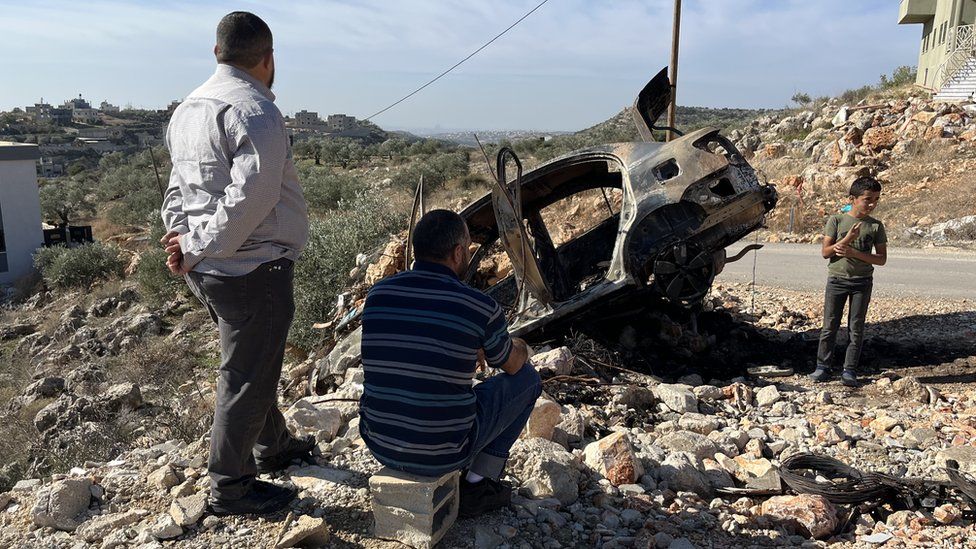-

-
-
Loading

Loading

A small Palestinian village in the hills south of Hebron called Khirbet Zanuta recently had its school and houses destroyed by a bulldozer. The village was abandoned about a month ago due to pressure and threats from armed Jewish settlers who reside in nearby outposts that are illegal under both Israeli and international law. The destruction of the school and village was accompanied by a twisted metal sign that read "Humanitarian Support to Palestinians at risk of forcible transfer in the West Bank," indicating the support of various European development agencies, including the European Union and the British Consulate-General Jerusalem. A former Israeli special forces soldier and activist with Breaking the Silence, Nadav Weiman, believes that the Jewish settlers, who are known by name to local Palestinians, continuously violate the law with the assistance of the police and army. Weiman claims that the settlers are demolishing Palestinian villages, assaulting farmers, stealing their olives, and trying to establish an eastern front against the Palestinians in the West Bank to acquire land without Palestinians. During their visit to the village, two Israeli soldiers appeared and accused a member of the BBC team of being a traitor for associating with Palestinians. The soldiers filmed the team but showed little interest in the demolished school and village. When inquiries were made to the police regarding an investigation into the village's destruction, they stated that they were waiting for a complaint. Palestinian lawyers had already submitted a petition to Israel's Supreme Court on behalf of the village's Palestinians. Throughout the occupied West Bank, Palestinians have reported a rise in violent attacks by armed Jewish settlers since the start of the war in Gaza. Even Israel's closest allies, such as the United States and the United Kingdom, have condemned the violence and called for the prosecution of those responsible for the crimes. However, settlers who end up in court usually face lenient sentences. The settlers are well-armed and supported by powerful allies within the Israeli government, including the Minister for National Security Itamar Ben Gvir and Finance Minister Bezalel Smotrich, who also holds security responsibilities in the West Bank. Smotrich recently allocated over $100 million to the settlers, provoking controversy with his comments comparing Palestinians to Nazis. Video evidence captured by a Palestinian named Muntassar Mhilat demonstrated the reality of settler attacks. In the video, about 20 armed Jewish men are seen invading Mhilat's family home, threatening and yelling at them. Instances of harassment against Palestinians extend beyond physical violence to economic and psychological aspects. In one example, Jewish settlers threatened Palestinian farmers south of Hebron, preventing them from using their tractor for fear of it being stolen or damaged. The olive season, a critical time for Palestinians, has also been marked by tension and restrictions imposed by settlers. Farmers in a village near Nablus called Burin are forbidden from harvesting their olives, causing the fruit to rot on the trees. Ahmed Tirawi, a farmer from Burin, expressed his powerlessness and humiliation in the face of settler attacks, stating that international law and the protection of people from the Israeli occupation are the only solutions. When speaking with a prominent settler leader named Yehuda Simon, he claimed that Palestinians who come to harvest olives are gathering information to carry out attacks. He dismissed reports of settlers attacking Palestinians and suggested that the Palestinians should not try to kill the settlers. The ongoing conflict between Arabs and Jews over this land has spanned more than a century. The recent war in Gaza has intensified violence in the West Bank, reinforcing Palestinians' fears that powerful forces within Israel's government and the settler movement want them to leave. The destruction of homes and settler violence further confirms Palestinians' worst fears, reminiscent of the events of 1948, known as the "Nakba," when more than 700,000 Palestinians were forced to flee or were expelled from their homes by Israel. Palestinians have been denied the right to return to their homes since then.